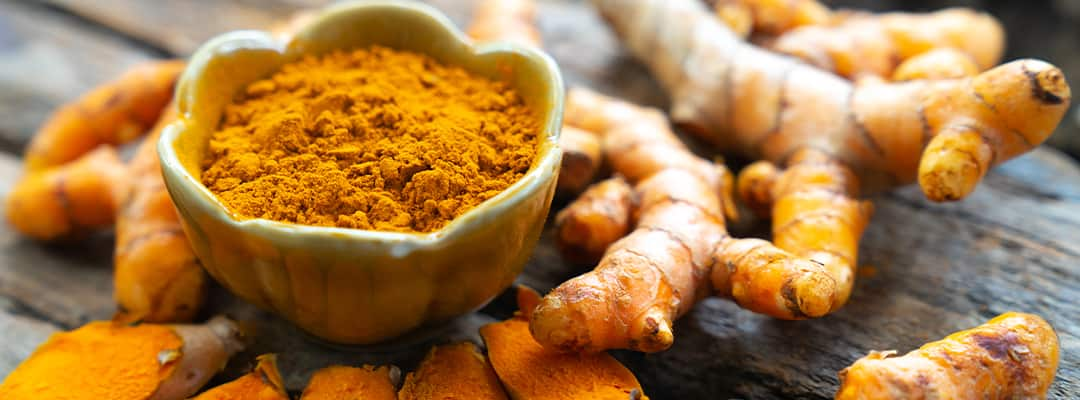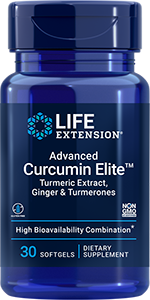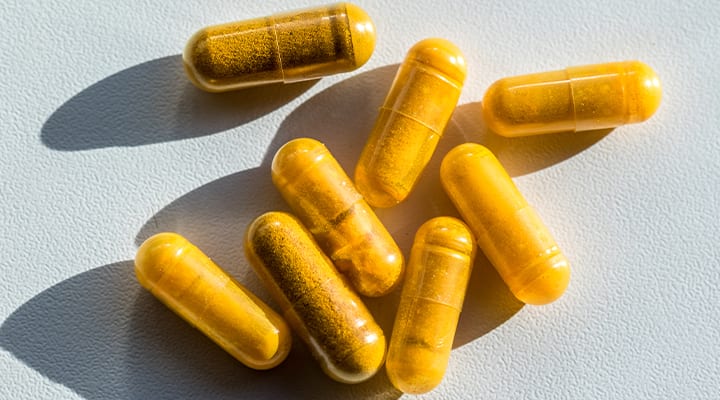
What Are the Benefits of Turmeric?
Published: September 2023
Turmeric: This extraordinary spice might just be the most effective health-promoting ingredient to exist! From supporting your mood to keeping your heart strong to promoting joint comfort, turmeric does so much more than add flavor to your food.
Don't get me wrong: turmeric is tremendous at flavoring foods (and adding a bright, cheerful color), but there's a good reason why curcumin supplements are found in the cabinets of health-seekers all over the world. This "magic golden spice," as it's sometimes called, is brimming with head-to-toe health benefits. Not familiar with this superfood? Let's get acquainted with this boss of the phytonutrients!
Top 5 benefits of curcumin
Turmeric has so many health benefits, honestly, it would be difficult to name them all! As a superfood, it confers antioxidant benefits that help support well-being—and it's all thanks to curcumin and other curcuminoids (the active compound in the golden spice) that turmeric is so famous.
So how do curcumin's antioxidant properties support your health? Here are five brilliant ways this active compound benefits your biology:
1. Brain health
Turmeric helps safeguard cognition. As you age, your hippocampus (an area in the brain associated with emotion, learning and memory) needs more support to produce brain-derived neurotrophic factor (BDNF). Curcumin provides health benefits for the brain by supporting a healthy inflammatory response and fighting free radicals, protecting neurocognition.
What does this mean for you? An improved ability to think and reason, better concentration, enhanced memory, and a better mood! Preclinical studies have shown that curcumin crosses the blood-brain barrier where it works with the brain and exerts many brain-boosting benefits, including the release of dopamine and serotonin, the body's feel-good chemicals. Plus, by increasing the brain's levels of BDNF, curcumin may help support brain cell health! (And just knowing about these surprising benefits is sure to prompt a sunnier outlook!)
2. Cardiovascular health
Because turmeric promotes a healthy inflammatory response and is a powerful antioxidant, it also plays an essential role in heart health. One of the best ways curcumin helps your ticker is by promoting healthy functioning of the lining of blood vessels, your endothelium. And when you have tip-top vascular function, your body can better support healthy blood pressure. As you age, your endothelial function declines, making curcumin (or turmeric extract) one of the best longevity supplements out there.
Curcumin also helps support already-healthy blood pressure by regulating the production of certain receptors that are involved in circulation. Additionally, research has shown that curcumin helps support already healthy HDL and LDL cholesterol levels. Maintaining healthy cholesterol levels is key for optimal blood vessel function.
Complement balanced meals and exercise with curcumin supplements and you've got the ultimate recipe for a healthy heart!
3. Muscle and joint comfort
Whether you want to run another lap around the track, deepen your yoga stretch or just feel better chasing your grandkids around the playground, curcumin has your back (and your front, and your knees, and your elbows, for that matter). High-quality turmeric supplements have garnered many accolades for supporting a healthy inflammatory response. The potent curcumin helps support joint comfort and promote mobility.
Curcumin's health benefits also include comfort in muscles and joints. When you exercise, it is normal for your muscles to experience some soreness; turmeric may help boost your workout by helping your muscles recover more efficiently.
4. Digestive and immune health
The curcumin in turmeric is immune-supportive because it modulates a lot of cells that are part of the immune system, including macrophages and B cells. B cells produce antibodies that help defend against microorganisms and other immune challenges that can impact your health. When your immune system functions optimally, you'll also notice an improvement in respiratory, bone, eye and skin health.
Research has also shown that curcumin supports digestive health. When it makes its way to the large intestine where many of the beneficial gut microbiome bacteria live, turmeric works with the bacterial champions of your gut, directly supporting your natural defenses. Plus, turmeric can function as a prebiotic, a food source for your microbiome (including trillions of microorganisms in your gut), promoting brain-gut health and optimal well-being.
5. Free radical protection
Think of oxidative stress's impact on your body as being similar to normal wear on your laptop, dishwasher or car. Free radicals are molecules that can affect the health and function of your DNA, cells, proteins, fats and more. As an antioxidant, turmeric is packed with potent compounds like curcumin with antioxidant properties, making it a fierce free radical scavenger. In other words, curcumin finds and quenches free radical activity, helping support your cells against oxidative stress.
How Does Curcumin Support a Healthy Inflammatory Response?
Your inflammatory response isn't the bad guy. When it's short term, it's highly beneficial for fighting off foreign invaders and maintaining tissue health.
When we say curcumin "supports a healthy inflammatory response," that doesn't mean it stops your inflammatory response, it means it works with biological pathways to help regulate the body's healthy inflammatory response, promoting comfort and encouraging cellular and tissue health.
Pro tip: Want to be proactive about managing healthy inflammation? Take a quiz and get personalized recommendations.
Explore Our Best Inflammation Health Support Supplements
What is turmeric?
With the Latin name Curcuma longa, turmeric is a very flavorful spice native to Southeast Asia. A perennial root, turmeric (or curcuma) is a warm, bitter spice that gives curry and mustard their vibrant yellow color. It's related to ginger—both are part of the Zingiberaceae family—and has been used for centuries throughout Asia, India, and the Middle East.
Turmeric is classified as a rhizome, meaning that it has a plant stem that grows below the earth (other famous rhizomes include the potato and rhubarb). The main active compounds are curcuminoids, specifically curcumin, a natural compound called a polyphenol that gives the root its deep, yellow-orange color. Research has shown that curcumin is where its treasure of benefits lay.
Turmeric has been used in Ayurvedic and traditional Chinese regimens for hundreds of years.
How to take turmeric for health benefits?
Incorporating turmeric regularly into your meals can boost your intake, for sure. If you choose to eat or drink it (think golden milk!) more often, consuming turmeric with a high-fat meal and adding black pepper will help your body absorb it better. That's because curcumin is fat-soluble and piperine, the active compound in black pepper, enhances its absorption.
Still, as a food, curcumin has low bioavailability, meaning it is poorly absorbed in the bloodstream. And the amounts of curcumin (and other curcuminoids) found in a serving of turmeric root will be much lower compared to a dietary supplement.
But what affects curcumin's bioavailability? The culprit is conjugation, a normal chemical reaction where one compound attaches to another, and once curcuminoids are conjugated, they don't provide the same health benefits as non-conjugated curcuminoids.
The good news is that you can take a curcumin dietary supplement designed to boost absorption with fiber from fenugreek seeds, which protect curcumin and other curcuminoids from conjugation, so you get enough of this health-promoting nutrient.
Turmeric or curcumin supplements come in a variety of forms, including turmeric extract, turmeric powder and turmeric tea.
Is it good to take turmeric every day?
Yes, a dietary supplement with curcumin can be taken every day! The health-promoting benefits are worth it. Research shows it's very well tolerated, even at high doses. You can add this flavorful spice to smoothies, curries, salads, or soups! A diet rich in plant-based foods, including the extraordinary turmeric root, will surely help quell some of the oxidative stress—so go ahead and help yourself to a generous serving of this powerful antioxidant!
Best supplements to pair with turmeric
You can complement turmeric's benefits with other nutrients to enhance the benefits. Here are three supplements that pair especially well with turmeric extract, depending on your primary health concern:
- Inflammation management: A dietary supplement containing pro-resolving mediators (PRMs)—specialized compounds made by the body that regulate pathways associated with the inflammatory response—is a great way to complement curcumin's benefits. These PRMs help remove cellular debris getting in the way of your optimal health and help encourage healthy tissue rejuvenation. Curcumin, curcuminoids, and PRMs are a winning combo, and together they support the "before, during and after" process of your healthy inflammatory response.
- Joint health: Want to please your knees? Consider pairing your curcumin or turmeric supplement with botanicals such as tamarind, white mulberry, cutch tree, Chinese skullcap and ingredients such as collagen and hyaluronic acid. Curcumin and turmeric make the perfect complement to a joint-friendly lifestyle.
- Heart and blood vessel health: Pair your dietary supplement with amla or pomegranate to help support a healthy heart and optimal endothelial function.
Curcumin (and other curcuminoids in turmeric) positively impact vital areas of your health, conferring so many health benefits to your brain, heart and immune system, and more. Turmeric's ability to promote a healthy inflammatory response and neutralize free radical activity is unparalleled. And you can help your body get the most out of the curcuminoids in the golden superfood by choosing high-quality curcumin or turmeric supplements that enhance bioavailability. Remember to speak with your doctor before starting any supplement.
References
- Baratzadeh F, et al. "Effects of curcumin on low-density lipoprotein oxidation: From experimental studies to clinical practice." Excli J. 2022. https://www.ncbi.nlm.nih.gov/pmc/articles/PMC9441680/
- Beba M, et al. "The effect of curcumin supplementation on delayed-onset muscle soreness, inflammation, muscle strength, and joint flexibility: A systematic review and dose-response meta-analysis of randomized controlled trials." Biopharmaceutics & Drug Disposition. May 2022. https://onlinelibrary.wiley.com/doi/10.1002/ptr.7477
- Benameur T, et al. "Curcumin as prospective anti-aging natural compound: Focus on brain." Molecules. August 2021. https://www.ncbi.nlm.nih.gov/pmc/articles/PMC8398038/
- Chen M, et al. "Use of curcumin in diagnosis, prevention, and treatment of Alzheimer's disease." Neural Regeneration Research. April 2018. https://www.ncbi.nlm.nih.gov/pmc/articles/PMC5950688/
- Edwards RL, et al. "The anti-inflammatory activity of curcumin is mediated by its oxidative metabolites." Journal of Biological Chemistry. December 2017. https://www.ncbi.nlm.nih.gov/pmc/articles/PMC5766941/
- Giordano A, Giuseppina T. "Curcumin and Cancer." Nutrients. October 2019. https://www.ncbi.nlm.nih.gov/pmc/articles/PMC6835707/
- Jiang S, et al. "Curcumin as a potential protective compound against cardiac diseases." Pharmacological Research. May 2017. https://www.sciencedirect.com/science/article/abs/pii/S1043661816313603?via%3Dihub
- Mizoguchi Y, et al. "Lower brain-derived neurotrophic factor levels are associated with age-related impairment in community-dwelling older adults: the Sefuri study." Nature. October 2020. https://www.nature.com/articles/s41598-020-73576-1
- Poles J, et al. "The effects of twenty-four nutrients and phytonutrients on immune system function and inflammation: A narrative review." Journal of Clinical and Translational Research. June 2021. https://www.ncbi.nlm.nih.gov/pmc/articles/PMC8259612/
- Qin S, et al. "Efficacy and safety of turmeric and curcumin in lowering blood lipid levels in patients with cardiovascular risk factors: a meta-analysis of randomized controlled trials." Nutrition Journal. October 2017. https://www.ncbi.nlm.nih.gov/pmc/articles/PMC5637251/
- Santos-Parker JR, et al. "Curcumin supplementation improves vascular endothelial function in healthy middle-aged and older adults by increasing nitric oxide bioavailability and reducing oxidative stress." Open-Access Impact Journal on Aging. January 2017. https://www.ncbi.nlm.nih.gov/pmc/articles/PMC5310664/








